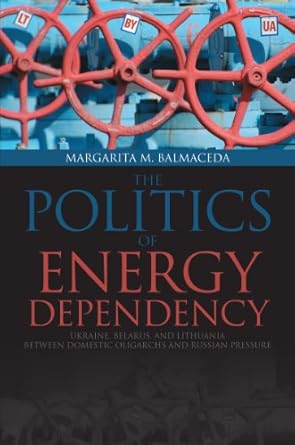| Kindle Price: | $53.00 |
| Sold by: | Amazon.com Services LLC |
Your Memberships & Subscriptions

Download the free Kindle app and start reading Kindle books instantly on your smartphone, tablet, or computer - no Kindle device required.
Read instantly on your browser with Kindle for Web.
Using your mobile phone camera - scan the code below and download the Kindle app.

Follow the author
OK
Politics of Energy Dependency: Ukraine, Belarus, and Lithuania between Domestic Oligarchs and Russian Pressure (Studies in Comparative Political Economy and Public Policy Book 40) Kindle Edition
Energy has been an important element in Moscow’s quest to exert power and influence in its surrounding areas both before and after the collapse of the USSR. With their political independence in 1991, Ukraine, Belarus, and Lithuania also became, virtually overnight, separate energy-poor entities heavily dependent on Russia. This increasingly costly dependency – and elites’ scrambling over associated profits – came to crucially affect not only relations with Russia, but the very nature of post-independence state building.
The Politics of Energy Dependency explores why these states were unable to move towards energy diversification. Through extensive field research using previously untapped local-language sources, Margarita M. Balmaceda reveals a complex picture of local elites dealing with the complications of energy dependency and, in the process, affecting the energy security of Europe as a whole.
A must-read for anyone interested in Eastern Europe, Russia, and the politics of natural resources, this book reveals the insights gained by looking at post-Soviet development and international relations issues not only from a Moscow-centered perspective, but from that of individual actors in other states.
- LanguageEnglish
- PublisherUniversity of Toronto Press
- Publication dateJuly 23, 2015
- File size2769 KB
Customer reviews
- 5 star4 star3 star2 star1 star5 star67%33%0%0%0%67%
- 5 star4 star3 star2 star1 star4 star67%33%0%0%0%33%
- 5 star4 star3 star2 star1 star3 star67%33%0%0%0%0%
- 5 star4 star3 star2 star1 star2 star67%33%0%0%0%0%
- 5 star4 star3 star2 star1 star1 star67%33%0%0%0%0%
Customer Reviews, including Product Star Ratings help customers to learn more about the product and decide whether it is the right product for them.
To calculate the overall star rating and percentage breakdown by star, we don’t use a simple average. Instead, our system considers things like how recent a review is and if the reviewer bought the item on Amazon. It also analyzed reviews to verify trustworthiness.
Learn more how customers reviews work on AmazonTop reviews from the United States
There was a problem filtering reviews right now. Please try again later.
- Reviewed in the United States on June 2, 2020The book is an indispensable resource for undergraduate and graduate courses in international relations and diplomacy, governance, energy politics, and international political economy. In the book, Dr. Balmaceda presents The Cycle of Rents Model, which consists of four important components. First, the model looks at the political system and domestic political arrangements to understand the lack of reforms and clear policies post-independence years. Secondly, extraction as a source for potential rents, such as preferred prices from Russia. Thirdly, the model looks at how rent extractions affect distribution, which includes informal and formal institutions and mechanisms for negating and distributing rents. Lastly, the model included a recycling stage, which assesses what institutions and how special interest groups affect reforms and clear policy. Throughout the book, Dr. Balmaceda provide in-dept analysis on rent seeking by exporting Russian gas, selective payments, transfer of liability to the state, the use of barter system and price manipulation by FSU states. The book provides detail understanding as to how energy rents within the three states occurred in the forms of internal and external extractions, where internal extractions represented below market prices, and external extractions were due to increases of energy subsidies. The author provides excellent analysis of rent distributions by examining the political actors, formal and informal institutions involved. The author points out while some FSU states’ special groups and elites had greater access to distribution of rents because of informal mechanisms, others had large corporations enjoying greater access to distribute benefits. In the recycling stage, the author outlines how rent distributions became an important source for income and political purpose for states. Dr. Balamceda explains FSU states were unable to implement clear policies, because selling policies for higher prices for energy to constituents are not favorable and pose political risks for those in power.
Dr. Balmaceda makes a valuable contribution to the overall discussion and understanding as to why some states continue to rely on Russian energy supplies, as well as the reasons behind the lack of political will to implement new energy policies. The author stresses the significance of internal and external factors influencing such outcomes. The book suggests successful energy diversification heavily depends on the role of domestic politics, strong institutions, rule of law, and level of transparency to implement effective energy policies. These factors are necessary to understand ongoing relationships between internal dynamics among domestic stakeholders, as well as influences from external forces. The Cycle of Rent Model developed by Dr. Balmaceda is an excellent framework for analyzing other states, such as Bulgaria and Romania, which are actively trying to shift energy dependency away from Russia, by diversifying their energy portfolios. If states are actively trying to shift towards renewable energy and investing in new energy infrastructure, it would be interesting to observe the responses from domestic institutions and players. Also, it would be interesting to observe and assess the preexisting informal practices and less visible negotiation tactics occurring between special interest groups, and how they can create long-term implications for these states.
- Reviewed in the United States on January 7, 2014After reading roughly 65% of this book, I would recommend it for undergraduate and graduate students, policymakers, practitioners, and journalists interested in learning about energy politics. Despite some obvious grammatical errors, this book does an excellent job diving deep into the relationship that three FSU have with Russia, based upon their reliance on Russia because of its immense amount of hydrocarbon resources. Furthermore,I recommend this book for courses in energy security and politics, and/or international political economy. Balmaceda does a great job logically explaining her argument, the states that will be discussed, why they will be discussed, and the two main questions that she hopes to answer. The book is very well structured, and sticks to answering the main questions set forth in the openning chapter of the book. In addition, Dr. Balmaceda does an outstanding job using sources of information from all four countries discussed, in order to demonstrate how Russia has used energy as a tool for dealing with states that were used to for so many years inexpensive energy prices. The book does an excellent job highlighting the embeddedness of corruption of individuals in the states discussed, and how powerful individual actors have been able to use their positions as influential politicians or businessmen in order to advance themselves and other select groups economically.




